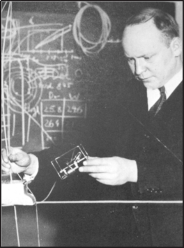- ROSSBY
- SWEDEN (see also List of Individuals)\
 28.12.1898 Stockholm/S - 19.8.1957 Stockholm/S\Carl-Gustaf Rossby graduated as a geophysicist in 1922 from the Technical University of Stockholm KTH, joined the Swedish Meteorological Institute and collaborated in Norway with Vilhelm Bjerknes (1862-1951). Rossby left in 1926 for the USA to direct the Meteorological Dept. of Massachusetts Institute of Technology MIT. By 1939, he took over as director the US Weather Bureau, and in 1941, Rossby founded the Department of Meteorology at University of Chicago which eventually became the central US institution. In 1947, Rossby returned to Stockholm and founded a similar Institute at KTH whose purpose was education of young scientists.\Rossby was a scientist with a broad interest. His mainly theoretical works were initially directed towards the effects of thermodynamics and turbulence on weather development including a novel thermodynamic diagram involving potential temperature and mixing of air masses. He developed also new isentropic methods of analysis for changes and prediction of weather stability and changes of humidity. Rossby applied the boundary layer theory to atmospheric processes. Later, his attention turned to a vortex theorem as applied to the dynamics of the atmosphere. Rossby also observed wave troughs and wave peaks in the upper atmosphere, which are commonly referred to as Rossby waves. In the early 1950s, he used the first computers for weather forecast. He also developed methods to determine atmospheric pollution from chemical sources and applied the results to agricultural issues. Rossby founded several scientific journals, including the Journal of Marine Research in 1939 and the Journal of Meteorology in 1944. From 1954 he presided over the International Union of Geodesy and Geophysics IUGG. Likewise, Rossby has had an impressive amount of honors. The Rossby number in hydrodynamics measures the relative importance of the rotational term as compared to inertia.\Anonymous (1935). Prof. C.-G. Rossby. Journal of Aeronautical Sciences 2(2): 73. P Anonymous (1958). Prof. C.-G. Rossby. Quarterly Journal Royal Meteorological Society 84: 88. Byers, H.-R. (1960). Carl-Gustaf Arvid Rossby. Biographical Memoirs of FRS 34: 249-270. P Cantù, V. (1974). Rossby. Scienziati e tecnologi 2: 435-438. Mondadori: Milano. PKutzbach, G. (1975). Rossby, Carl-Gustav Arvid. Dictionary scientific biography 11: 557-559. Rossby, C.G.A. (1939). On the role of isentropic mixing in the general circulation of the atmosphere. 5 IUTAM Congress Cambridge MA: 373-378.Rossby, C.G.A. (1943). Weather estimates from local aerological data. Misc. Report 2. Chicago. Sheppard, P.A. (1957). Prof. C.-G. Rossby. Nature 180: 1166.
28.12.1898 Stockholm/S - 19.8.1957 Stockholm/S\Carl-Gustaf Rossby graduated as a geophysicist in 1922 from the Technical University of Stockholm KTH, joined the Swedish Meteorological Institute and collaborated in Norway with Vilhelm Bjerknes (1862-1951). Rossby left in 1926 for the USA to direct the Meteorological Dept. of Massachusetts Institute of Technology MIT. By 1939, he took over as director the US Weather Bureau, and in 1941, Rossby founded the Department of Meteorology at University of Chicago which eventually became the central US institution. In 1947, Rossby returned to Stockholm and founded a similar Institute at KTH whose purpose was education of young scientists.\Rossby was a scientist with a broad interest. His mainly theoretical works were initially directed towards the effects of thermodynamics and turbulence on weather development including a novel thermodynamic diagram involving potential temperature and mixing of air masses. He developed also new isentropic methods of analysis for changes and prediction of weather stability and changes of humidity. Rossby applied the boundary layer theory to atmospheric processes. Later, his attention turned to a vortex theorem as applied to the dynamics of the atmosphere. Rossby also observed wave troughs and wave peaks in the upper atmosphere, which are commonly referred to as Rossby waves. In the early 1950s, he used the first computers for weather forecast. He also developed methods to determine atmospheric pollution from chemical sources and applied the results to agricultural issues. Rossby founded several scientific journals, including the Journal of Marine Research in 1939 and the Journal of Meteorology in 1944. From 1954 he presided over the International Union of Geodesy and Geophysics IUGG. Likewise, Rossby has had an impressive amount of honors. The Rossby number in hydrodynamics measures the relative importance of the rotational term as compared to inertia.\Anonymous (1935). Prof. C.-G. Rossby. Journal of Aeronautical Sciences 2(2): 73. P Anonymous (1958). Prof. C.-G. Rossby. Quarterly Journal Royal Meteorological Society 84: 88. Byers, H.-R. (1960). Carl-Gustaf Arvid Rossby. Biographical Memoirs of FRS 34: 249-270. P Cantù, V. (1974). Rossby. Scienziati e tecnologi 2: 435-438. Mondadori: Milano. PKutzbach, G. (1975). Rossby, Carl-Gustav Arvid. Dictionary scientific biography 11: 557-559. Rossby, C.G.A. (1939). On the role of isentropic mixing in the general circulation of the atmosphere. 5 IUTAM Congress Cambridge MA: 373-378.Rossby, C.G.A. (1943). Weather estimates from local aerological data. Misc. Report 2. Chicago. Sheppard, P.A. (1957). Prof. C.-G. Rossby. Nature 180: 1166.
Hydraulicians in Europe 1800-2000 . 2013.
